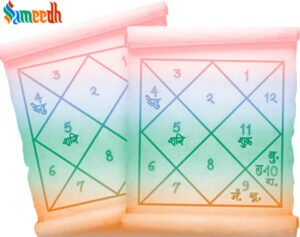In Hindu astrology, “Dosh” refers to flaws or unfavorable planetary combinations that are believed to have negative effects on various aspects of life.

In Hinduism, the individual who reads and interprets kundalis is commonly referred to as an “astrologer” or “jyotish.” Jyotish is a Sanskrit term that translates to “light” or “knowledge” and is often used to denote the practice of astrology in Hindu culture.
Astrologers or jyotishis study the positions of celestial bodies at the time of an individual’s birth and analyze the corresponding kundali to provide insights into various aspects of their life. They may also offer guidance, predictions, and remedies based on their interpretations of the kundali.
Astrology has been an integral part of Hindu culture for centuries, and astrologers hold a respected position within the community for their ability to provide guidance and insights into life events, personality traits, relationships, and more based on the principles of astrology.
In Hindu astrology, “dosh” refers to flaws or unfavorable planetary combinations that are believed to have negative effects on various aspects of life. Some common doshas found in kundalis include:
- Mangal Dosh: Mangal Dosh also known as Kuja Dosh or Manglik Dosh, it occurs when Mars (Mangal) is placed in certain positions in the kundali, particularly in the 1st, 4th, 7th, 8th, or 12th house from the ascendant, Moon, or Venus. Mangal Dosh is believed to cause difficulties in marriage and relationships, and remedies may be suggested to mitigate its effects.
- Sarpa Dosh: Sarpa Dosh or Kaal Sarpa Dosha occurs when all planets are situated between Rahu (North Node) and Ketu (South Node) in the kundali. It is believed to bring obstacles, delays, and challenges in various aspects of life. Remedies such as performing rituals or wearing gemstones may be recommended to alleviate its effects.
- Pitra Dosh: Pitra Dosh occurs when ancestors have not attained peace due to unresolved issues or unfulfilled duties in their lifetimes. It can manifest in the kundali of their descendants and is believed to cause familial problems, financial setbacks, and health issues. Remedies may include performing rituals, charity, and seeking blessings from ancestors.
- Grah Dosh: Grah Dosh refers to afflictions caused by malefic planets such as Saturn (Shani), Mars (Mangal), Rahu, and Ketu in specific positions in the kundali. Depending on the planetary combinations, Graha Dosha may lead to various challenges in life, including health problems, financial difficulties, and relationship issues. Remedies may involve propitiating the affected planets through prayers, rituals, or wearing gemstones.
- Nadi Dosh: Nadi Dosh occurs when the nadi (pulse) of the prospective bride and groom is the same. It is believed to indicate genetic incompatibility and may lead to health issues or difficulties in marital life. Astrologers often advise against marriages with Nadi Dosh, although remedies such as performing rituals or prayers may be suggested in some cases.
It’s important to note that while doshas are considered in Hindu astrology, their severity and impact on an individual’s life can vary based on the overall planetary configurations and other factors in the kundali. Additionally, the interpretation of doshas and the remedies recommended may differ among astrologers.